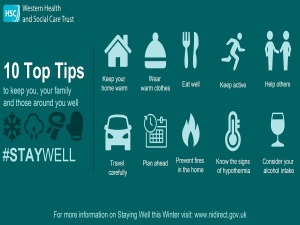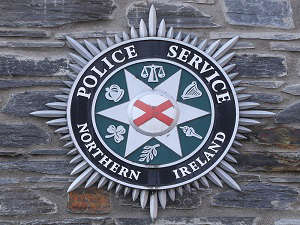
by Gráinne Connolly
The Western Health and Social Care Trust (Western Trust) is encouraging patients, clients, staff and members of the general public to keep warm and well this winter especially during extremely cold weather conditions.
Winter is traditionally a busy period for the Western Trust as it usually brings a range of winter ailments including coughs and colds, the flu and Norovirus (winter vomiting disease), all of which are spread very easily.
This time of year can also worsen people with chronic long term health problems, seeing them exacerbated, for example those with breathing problems like asthma and Chronic Obstructive Pulmonary Disease (COPD – a disease of the lungs) find the cold damp weather makes breathing harder.
In addition to this there's also an increase in injuries due to icy and snowy conditions, inevitably leading to slips and falls; especially among the elderly who are more likely to be seriously hurt and immobilised by breaks and sprains.
Dr Maura O'Neill, the Western Trust Head of Health Improvement said:
"The Trust is committed to promoting the health and well-being of staff, clients, patients and all members of the community.
"It is vitally important that we make people more aware of the effects of cold weather and provide advice on staying healthy.
"Prevention is always better than cure and there are things we can all do to ensure our community keeps well during the extreme weather conditions we are facing and throughout the rest of the winter.”

10 tips to keep you, your family and those around you well have been developed by the Western Trust:
-
Keep your home warm
Draw your curtains at dusk and keep your doors closed to block out draughts.
Your main living room should be between 18-21C (64-70F) and the rest of the house at a minimum of16C (61F).
Use a hot water bottle or electric blanket (but not both at the same time) to keep warm while you’re in bed. -
Wear warm clothes
Wrap up warm, inside and out. Wear several thin layers of clothes in order to keep the warm air trapped between them.
Wear hats, gloves and scarves and wear shoes with a good grip if you need to go outside. If you get wet, change into dry clothing as soon as you get indoors. -
Eat well
Food is a vital source of energy, which helps keep your body warm.
Try to eat regular hot meals to keep your energy levels up and drink hot drinks to help you to feel warmer for longer. -
Keep active
Move around at least once an hour and don’t sit down for long periods of time. Even light exercise will help keep you warm in your home. -
Help others
Check on friends, relatives and neighbours who may be more vulnerable in cold weather.
Make sure they're warm enough, especially at night, and have stocks of food and medicines. -
Travel carefully
Icy pavements and roads can be extremely slippery. Take extra care if you go out, and wear boots or shoes with good grip on the soles.
Bear in mind that black ice on pavements or roads might not be clearly visible, and compacted snow may turn to ice and become slippery. -
Plan ahead
Check the weather forecast before traveling so that you are prepared for journeys and keep a list of people at hand that you can contact if you are unable to get out of your home . -
Prevent fires in the home
Unplug heaters/blankets when not in use
Don’t leave candles unattended
Do not use portable heaters for drying clothes
Make sure you have a fitted and working smoke alarm and carbon monoxide monitor. -
Recognise the signs of hypothermia
Hypothermia is caused by being in a cold environment. People who are particularly at risk are those who are elderly, ill or babies.
If someone you know has been exposed to the cold and they are distressed, confused, have slow, shallow breathing or they're unconscious, they may have severe hypothermia.
In this case, dial 999 immediately to request an ambulance. While waiting for medical help, it is important to try to prevent further heat loss and gently warm the person. -
Consider you alcohol intake
Staying within the lower risk guidelines will go a long way to avoiding cold-related dangers such as hypothermia and falling.
Knowing how you’re getting home, sticking with friends and wearing warm clothes will also help to ensure you have a safe night out.
If you do become unwell there are also a range of services that can help you:
- Your GP is your first port of call for non-urgent illnesses that won’t go away, such as ear pain, vomiting, sore tummy, back ache
-
Lots of conditions (including hangover, grazed knee, sore throat, coughs and colds) can be treated at home by self-care
-
A visit to your local pharmacy can treat lots of medical conditions including diarrhoea, runny nose, and painful cough.
-
GP out of hours is available if you require urgent medical care when your GP surgery is closed
-
Your local Emergency Department provides urgent treatment for serious, life threatening illnesses
-
Call 999 in emergency situations.


 Investigation into ‘missing’ notes from key Executive meeting
Investigation into ‘missing’ notes from key Executive meeting
 Teenage girl killed in road crash named as Kamile Vaicikonyte
Teenage girl killed in road crash named as Kamile Vaicikonyte
 Covid-19 inquiry ‘an opportunity for candour’ from Stormont leaders
Covid-19 inquiry ‘an opportunity for candour’ from Stormont leaders
 UK and Irish ministers to meet amid row over migration
UK and Irish ministers to meet amid row over migration
 Three men set to go on trial for murder of journalist Lyra McKee
Three men set to go on trial for murder of journalist Lyra McKee